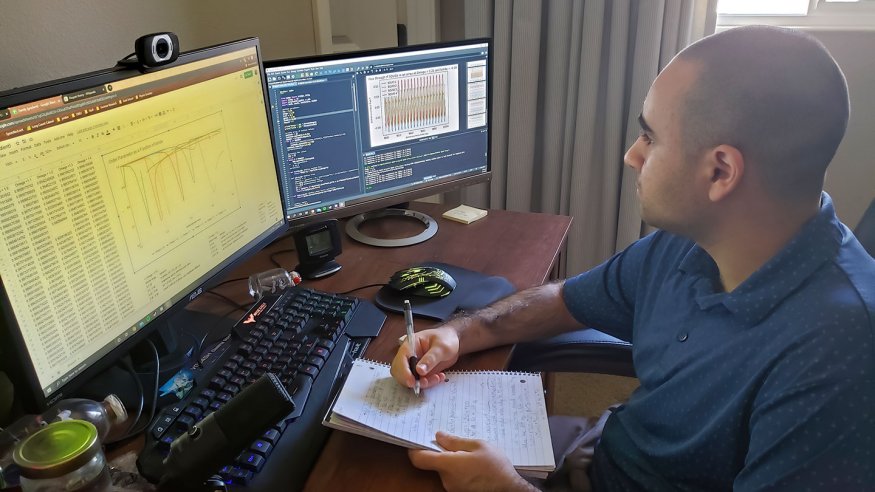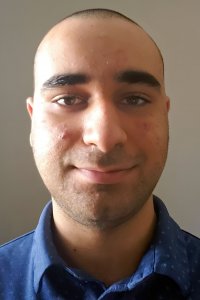
A Physics Phenomenon
Ohio Wesleyan Student Explores the Science Behind Josephson Junctions

Name: Dave Shaibe ’21
Hometown: Palo Alto, California
Major: Physics
Minor: Mathematics
OWU Connection Experience: Ohio Wesleyan’s Summer Science Research Program
Shaibe is spending 10 weeks studying “Coupled Nonlinear Systems: The Physics of Josephson Junction Arrays” under the mentorship of Brad Trees, Ph.D., OWU’s Richardson-Linebaugh Professor of Physics and Astronomy. Shaibe is studying Josephson junctions, a type of electronic circuit made up of two superconductors, and whether they will synchronize or resynchronize under different conditions.
“Our work will also expand the body of knowledge of nonlinear dynamical systems and the coupling of oscillators,” Shaibe says, “which can be applied in many scientific disciplines such as physics, chemistry, and biology.”
What I’m Researching
“Essentially, we are researching the behavior of arrays of so called rf SQUIDs, or Superconducting QUantum Interference Devices,” he says. “These SQUIDs have oscillatory behavior (repeated motion), and we are focusing on the synchronization and stability of these oscillations when the SQUIDs are put in coupled arrays.
“Will the system be able to overcome small perturbations and synchronize again, or will the perturbations grow over time? Our analysis of the robustness of these arrays using various parameter values should hopefully provide a greater understanding of the behavior of rf SQUIDs and knowledge of the parameter values that arrays should be fabricated with depending on the goal.
“SQUIDs are very sensitive to magnetic fields and so are used in the field of biomagnetism, for example, where the fields are very small. Furthermore, rf SQUIDs are currently being looked at as potential parts for quantum computing.”
How My Research Ties Back to My OWU Classes
“Dr. Trees and I write programs to simulate the systems we are studying, and then plot and analyze the data, similar to a lab course but on a much higher level. To understand what the data mean, a knowledge of electromagnetic theory is needed, and the data collection process involves differential equations and linear algebra.”
How My Research Ties into My Future Plans
“I want to do research as a career, specifically focused on condensed matter topics like this one. I am particularly interested in electromagnetic theory and, at the moment, would like to work with either semi- or superconductors.”
Why I Chose Ohio Wesleyan
“I wanted to go to a place with a real sense of community where people supported each other. I visited several college campuses before making my decisions, and OWU felt the most welcoming. … I wanted somewhere small and intimate, where I could come to professors one-on-one at any time, not just if I have questions on the coursework but also just to talk or ask for advice.
“I’m not exactly the poster child for a liberal arts education because my life is pretty much devoted to physics at this point and the only thing I do outside of it is German. But I wasn't shoehorned into this, I chose it, and I appreciate having that choice.
“I have friends across disciplines, and it is always interesting to compare what we've learned. I think that it is easy to forget in a classroom setting that everything is actually connected and that there isn't really a discipline divide outside of academia and to truly understand something you have to explore it from different angles.
“As an example, I will use physics, which is what I know. Understanding concepts is very important, but if you can't do the math to apply the concepts. you won't get anywhere. And if you don't know the historical context of what led to discoveries and the people involved, you will have an incomplete picture of the theories. And if you can't communicate your ideas and write your findings in well-put-together papers, no one will talk about your work.
“This, I think, is the purpose of The OWU Connection, to show people that just studying the classes required for their major is not enough.”
My Plans after Graduation
“I plan to go to grad school and get a doctorate in physics. Afterward, I would like to be a researcher, and I might end up as a professor – though at the moment that seems like a crazy idea as I do not feel qualified to teach anyone anything. Of course, after getting a Ph.D., I would be, but it is still a strange idea to consider for now.”
